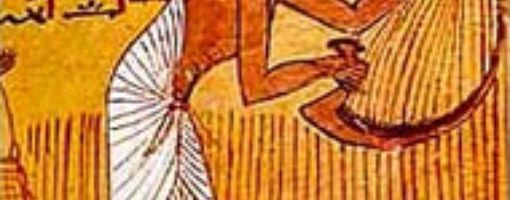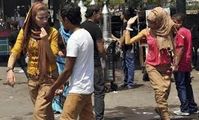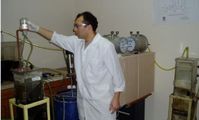THE SOCIETY OF ANCIENT EGYPT

Egypt was always an absolute monarchy, the king or Pharaoh was believedto be a god living on earth who, after his apparent death, would return to jointhe other deities. He bore the title « Child of the Sun » and representedreligious, political and military power throughout Egypt. He was assisted by a «vizier » who was the head of the executive. The word « pharaoh » is in fact aGreek distortion of an Egyptian word referring to the royal palace. It wasonly in the New Kingdom from about 1580 B.C. that « pharaoh » came to meanthe per-son of the sovereign himself.
Socialand Administrative ConstitutionThe inhabitants of Egypt were divided into classes; the most respectedbeing that of the priests charged with the upkeep of the temples. Rich and veryinfluential, they were exempted from taxes and were maintained at the expense ofthe temple. The other classes were the nobility, charged with the higher levelsof religious and political government of the provinces, the scribes or civilservants of the royal administration, and the people itself who were mainlypeasants and artisans.
Agriculture
From the most remote periods Egypt has been an essentiallyagricultural country and it has always produced fruit, broad beans, lentils,flax and above all cereals, especially wheat and millet, which wereexported in large quantities. As can be seen from the paintings of variousperiods which show work in the fields, the implements used have always been moreor less the same as those used today.
Industryand Commerce
The Egyptians also practiced the industrial arts and commerce. The largevariety of objects found in the tombs shows that they were able to work gold,silver and copper with rare skill and that in the cutting of precious stonesthey reached an incredible degree of perfection. They excelled particularly inthe art of adornment (rings, bracelets, pendants, and earrings) which reached aseries of high points under the IVth, Xllth, XVIIIth and XXth dynasties. Theyproduced textiles of great distinction from essentially very simple materials.They also made pottery, glass, and enamel. They did not use money. With thepeoples of Nubia they exchanged the products of agriculture and industry,wheat and onions, arms and jewels, for woods and skins, gold and ivory. Spicesand incense came from Arabia while from Phoenicia they imported cargoes of cedarwood.
From the XVIIIth dynasty on the Egyptians established close tradingrelations with the countries touched by the Euphrates and with the islands ofthe eastern Mediterranean. For example Cyprus furnished them withcopper.
TheSciences
According to the teachings of the priest man acquired his ideas onscience from Thot, the lunar god also called Hermes Trismegistus, a Greek namemeaning « three times very great ». The social institutions of Ancient Egyptwere attributed to another Hermes. Considered to be the inventor of writing he(Thot or Hermes the second?) wrote all his works under the inspiration ofthe Supreme God.
Ancient Egypt was very advanced in astronomy. From earliest times theEgyptians, following their observations of the motion of the celestialbodies, had used an astronomical year divided into three agriculturalseasons of four months each corresponding to flooding, sowing andharvesting. To the total of 360 days thus obtained were added five extra dayscalled « epagome-ni » which were treated as major feast days. On the other handas far as medicine was concerned we find that from earliest times it wasassociated with magic. Various medical texts, some on gynecology, somecontaining formulae and remedies, some on surgery, have come down tous.
Egyptian doctors were certainly familiar with the therapeutic valueof some plants. On the other hand they did not have a very thorough knowledge ofanatomy which is somewhat surprising in view of the fact that they practicedmummification.
This is because of their religious beliefs which considered the bodyto be sacred.
Your Rating:
Overall rating: 3.000
Totally voted: 1
Comments
Weather in:
Exchange Rates
-
IMF loan expected next month
Apr 22, 2013, rating: 3.000, 3 votes Egypt may secure an International Monetary Fund loan agreement in about amonth, state news agency MENA reported, quoting "informed" sources ...
Egypt may secure an International Monetary Fund loan agreement in about amonth, state news agency MENA reported, quoting "informed" sources ...
-
Egypt received 11 million tourists in 2012 and aims to boost that number to 14 million in 2013.
Jan 22, 2013, rating: 3.000, 2 votes
Egypt received 11 million tourists in 2012 and aims to boost that number to 14 million in 2013.
-
Egypt limits travelers leaving country to US$10,000 in cash
Dec 26, 2012, rating: 3.250, 4 votes Egypt has banned travelers from carrying more than US$10,000 in foreigncurrency cash in or out of the country ...
Egypt has banned travelers from carrying more than US$10,000 in foreigncurrency cash in or out of the country ...
-
National Coalition on Climate Change for Egypt is born
Nov 30, 2012, rating: 5.000, 1 votes The global COP18 conference on climate change opens in Doha Monday.About 17,000 participants from all over the world ...
The global COP18 conference on climate change opens in Doha Monday.About 17,000 participants from all over the world ...
-
Judgment for sexual harassment
Nov 14, 2012, rating: 3.600, 5 votes A man was sentenced to two years in prison and fined LE 2,000 for sexually harassing a woman, an ...
A man was sentenced to two years in prison and fined LE 2,000 for sexually harassing a woman, an ...
-
Scientists are enthusiastic about hydrogen's green applications
Nov 13, 2012, rating: 4.000, 3 votes
As fossil fuel reserves decrease, many countries are turning to hydrogen as one of the main sources of alternative energy ...








